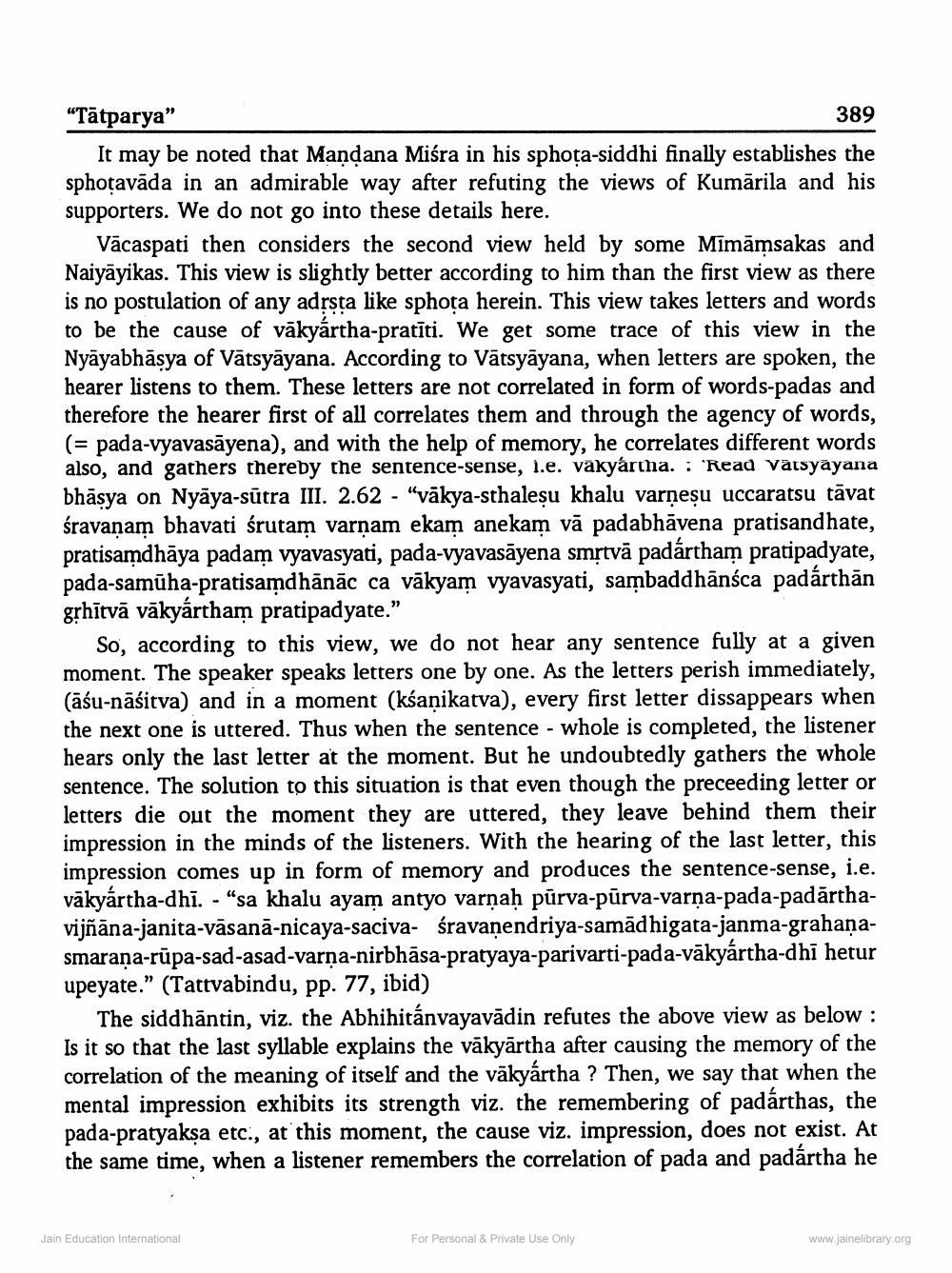________________
"Tātparya"
389
It may be noted that Mandana Miśra in his sphota-siddhi finally establishes the sphoṭavāda in an admirable way after refuting the views of Kumārila and his supporters. We do not go into these details here.
Vacaspati then considers the second view held by some Mimamsakas and Naiyayikas. This view is slightly better according to him than the first view as there is no postulation of any adṛṣṭa like sphota herein. This view takes letters and words to be the cause of vakyártha-pratīti. We get some trace of this view in the Nyayabhāṣya of Vatsyāyana. According to Vatsyāyana, when letters are spoken, the hearer listens to them. These letters are not correlated in form of words-padas and therefore the hearer first of all correlates them and through the agency of words, (= pada-vyavasayena), and with the help of memory, he correlates different words also, and gathers thereby the sentence-sense, 1.e. vakyártha. Read Vatsyāyana bhāṣya on Nyāya-sūtra III. 2.62 - "väkya-sthaleṣu khalu varṇeṣu uccaratsu tavat śravanam bhavati śrutam varnam ekam anekam vā padabhāvena pratisandhate, pratisamdhāya padam vyavasyati, pada-vyavasayena smṛtvā padártham pratipadyate, pada-samuha-pratisamdhānāc ca vakyam vyavasyati, sambaddhānśca padárthān gṛhītvā vākyártham pratipadyate."
So, according to this view, we do not hear any sentence fully at a given moment. The speaker speaks letters one by one. As the letters perish immediately, (aśu-nāśitva) and in a moment (ksaṇikatva), every first letter dissappears when the next one is uttered. Thus when the sentence - whole is completed, the listener hears only the last letter at the moment. But he undoubtedly gathers the whole sentence. The solution to this situation is that even though the preceeding letter or letters die out the moment they are uttered, they leave behind them their impression in the minds of the listeners. With the hearing of the last letter, this impression comes up in form of memory and produces the sentence-sense, i.e. vākyártha-dhi. - "sa khalu ayam antyo varṇaḥ pūrva-pūrva-varṇa-pada-padarthavijñāna-janita-vāsanā-nicaya-saciva- śravanendriya-samad higata-janma-grahaṇa
smaraṇa-rupa-sad-asad-varṇa-nirbhasa-pratyaya-parivarti-pada-väkyártha-dhi hetur upeyate." (Tattvabindu, pp. 77, ibid)
The siddhantin, viz. the Abhihitánvayavādin refutes the above view as below: Is it so that the last syllable explains the vakyārtha after causing the memory of the correlation of the meaning of itself and the vakyártha ? Then, we say that when the mental impression exhibits its strength viz. the remembering of padárthas, the pada-pratyakṣa etc., at this moment, the cause viz. impression, does not exist. At the same time, when a listener remembers the correlation of pada and padártha he
Jain Education International
For Personal & Private Use Only
www.jainelibrary.org




